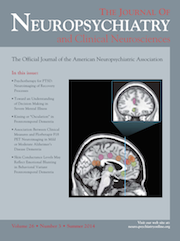Reversible Tongue Atrophy in Acetylcholine Receptor Positive Bulbar Onset Myasthenia Gravis
Case
To the Editor: A 27-year-old Indian woman was admitted with a 20-day history of difficulty in swallowing, change in voice with diurnal variation, and fatiguability. There was no history of diplopia, drooping of eyelids, difficulty in eye closure, and facial weakness. On examination, patient showed tongue atrophy with fasciculation, minimal limb weakness, and absent tendon reflexes. Fatiguability tests were positive. Repetitive nerve stimulation revealed decremental response. Computerized tomography scan of thorax showed thymic enlargement. Acetylcholine receptor (AChR) antibody was positive (11.3 nmol/l). Antimuscle-specific receptor tyrosine kinase (Anti-MuSK) antibody was negative. The patient progressed to respiratory distress within a day of admission and required ventilatory support followed by tracheostomy. She was diagnosed as myasthenic crisis. As the patient could not afford plasmapheresis and intravenous immunoglobulin, injection methylprednisolone was given and planned for thymectomy. Patient lost regular follow-up.
After 3 months, the patient presented again with bulbar weakness with minimal limb weakness. On examination, the patient showed tongue atrophy with fasciculation. The patient progressed to respiratory failure requiring ventilatory support. Plasmapheresis was given. On follow-up after 4 weeks, tongue fasciculation disappeared and tongue atrophy is improved.
Discussion
Myasthenia gravis (MG) is an autoimmune disease caused by binding of autoantibodies to receptors involved in neuromuscular transmission. About 80% of patients have detectable serum antibodies against AChR (AChR-Ab). Approximately 15%−20% of MG patients do not have any detectable AChR-Ab. Of these patients, antibodies against muscle specific tyrosine kinase (MuSK) are positive in 30%−50%. Three types of AChR antibodies are identified including acetylcholine binding, blocking, and modulating antibodies.
Histological examination revealed that myopathic changes (mini-cores and ragged red fibers/ mitochondrial aggregates) were common in MuSK MG patients, whereas fiber-type grouping (neurogenic finding) and atrophy were frequent in AChR MG patients.1 The presence of fiber type grouping in AChR positive MG group might be explained by the blockage of AChR receptor binding that causes the internalization and degradation of AChR leading to denervation of affected muscle.2
In our present case, the patient had bulbar onset MG that progressed to myasthenic crisis. The patient was treated with plasmapheresis and steroids after which she recovered. The unusual finding in this case was tongue atrophy with fasciculation that improved with plasmapheresis.
Cranial and bulbar muscle weakness with atrophy including tongue is more common in anti-MuSK MG.3,4 Tongue atrophy is a rare feature of AChR antibody positive MG.5 The exact pathogenesis of tongue atrophy is not known.
Bulbar onset MG is relatively rare. Tongue atrophy with fasciculation has been reported in anti-MuSK myasthenia gravis but rare in AChR antibody positive MG. We report this rare case of AChR antibody positive bulbar onset MG with tongue atrophy and fasciculation, and improvement following plasmapheresis.
1 : Muscle histopathology in myasthenia gravis with antibodies against MuSK and AChR. Neuropathol Appl Neurobiol 2009; 35:103–110Crossref, Medline, Google Scholar
2 : Accelerated degradation of acetylcholine receptor from cultured rat myotubes with myasthenia gravis sera and globulins. Proc Natl Acad Sci USA 1977; 74:2130–2134Crossref, Medline, Google Scholar
3 : Clinical correlates with anti-MuSK antibodies in generalized seronegative myasthenia gravis. Brain 2003; 126:2304–2311Crossref, Medline, Google Scholar
4 : MRI and clinical studies of facial and bulbar muscle involvement in MuSK antibody-associated myasthenia gravis. Brain 2006; 129:1481–1492Crossref, Medline, Google Scholar
5 : Myasthenia gravis—a rare presentation with tongue atrophy and fasciculation. Age Ageing 2006; 35:87–88Crossref, Medline, Google Scholar



